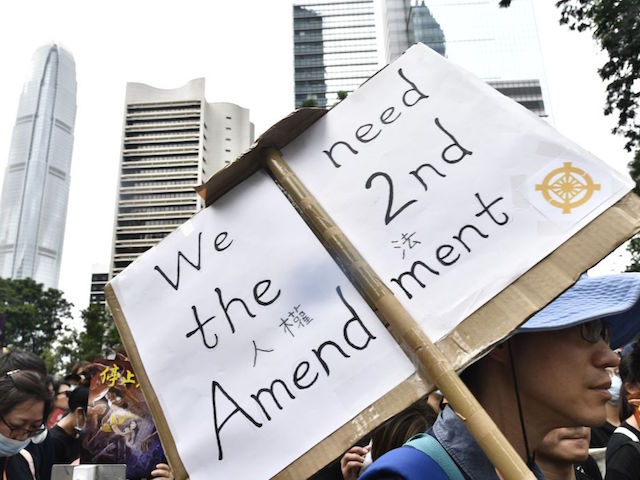The pro-democracy protests in Hong Kong should be instructive for everyone in this country. You have a territory that was once a colony of Britain and is now essentially a vassal state of Red China. The people there have never been entirely free. While freer as a British colony, they were still ruled by edicts from London. Now as part of China with the “one country, two systems” policy, they are still ruled from afar. What they want is what we take for granted in the US – human rights, freedom, and democracy.
These protesters understand something that all the Democrats running for president, much of the media, and even too many Republicans don’t. That is the real purpose of the Second Amendment.
 |
| Anthony Wallace/AFP/Getty Images |
They don’t plan to go duck hunting or deer hunting in Hong Kong. They fully understand the Second Amendment is what gives the people the power to change or overthrow a tyrannical government. While former presidential candidate Rep. Eric “Nuke’em” Swalwell is incredulous that people armed with mere small arms could take on a world power, one need only look to Afghanistan or to our former adversaries in Vietnam.
Modern technology gives the pro-democracy protesters a communication advantage that is hard to stop. They have found that Tinder can be used for more than hookups and that Poke’man Go isn’t just for my son-in-law to drive my daughter crazy.
Posting information about protests on Tinder is just one of several creative ways Hongkongers are using technology to mobilize people. For more than eight weeks now, technology has been at the center of organizing demonstrations against a controversial extradition bill.
People primarily communicated through Telegram groups and streamed their actions on gaming platform Twitch. As violence has escalated in recent weeks, though, police have been cracking down harder. So now protesters are resorting to more unorthodox methods of organizing and communicating online.
One of those methods, besides Tinder, is Pokémon Go.
When the Hong Kong police denied protesters permission to march in one of the city’s suburban neighborhoods on safety grounds, the protesters decided to say that they weren’t going for a march — they were just showing up for a game of Pokémon Go.
Rather than sneaking out messages like dissidents did using samizdat in the old Soviet Union, protesters are using Apple’s peer-to-peer AirDrop to pass on information to visitors from the rest of China. These visitors normally would only hear what the government allowed them to hear in China.
What makes AirDrop the ideal communication tool in this case is that it bypasses Chinese censors; news of protests in Hong Kong against the extradition bill have been blocked on popular social media platforms in China such as Weibo, WeChat and Baidu
I don’t know what will eventually happen in Hong Kong. Nonetheless, we in the United States should be paying attention. This is true especially now that you have media and technology giants controlling some much of what we see and hear. When you combine that with the statist nature of most politicians, right or left, it becomes an imperative that alternate voices are heard. You know like ones that ask the hard questions about the efficacy of background checks or red flag laws.
